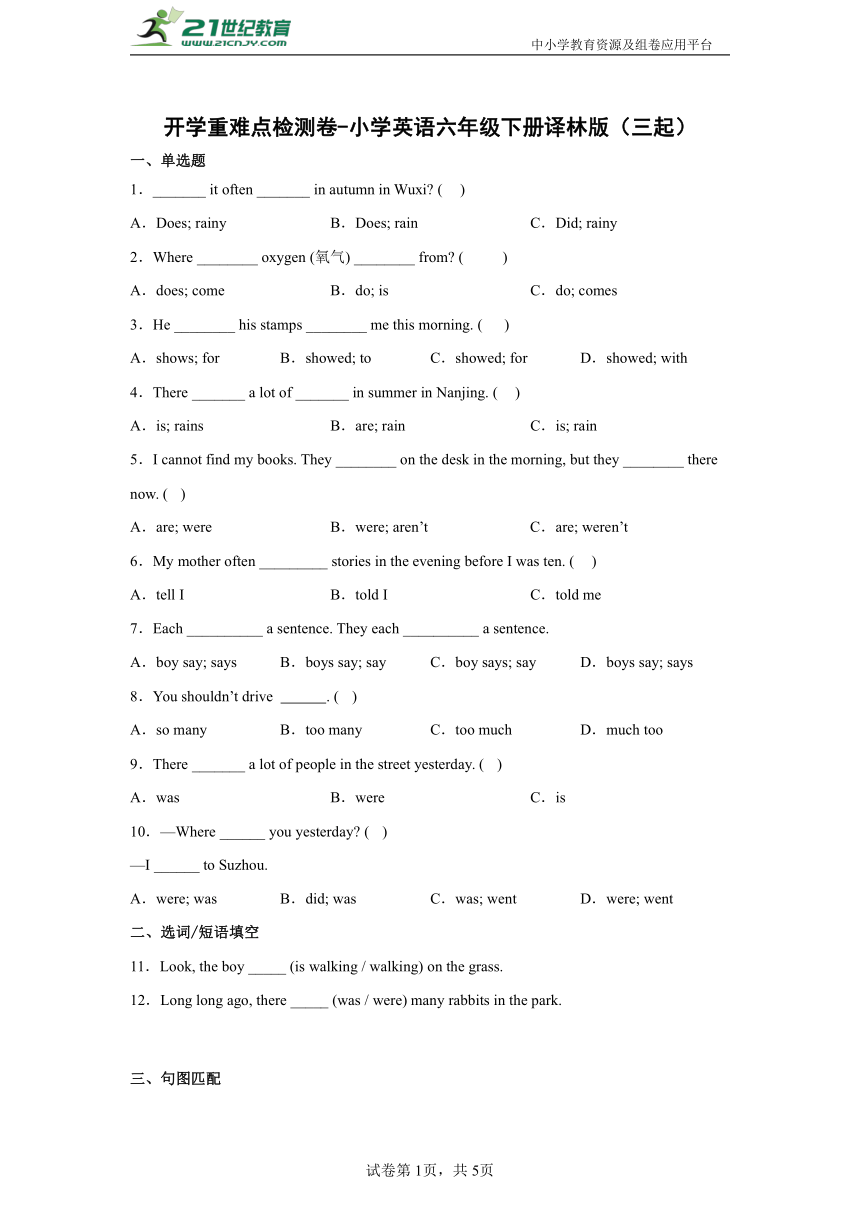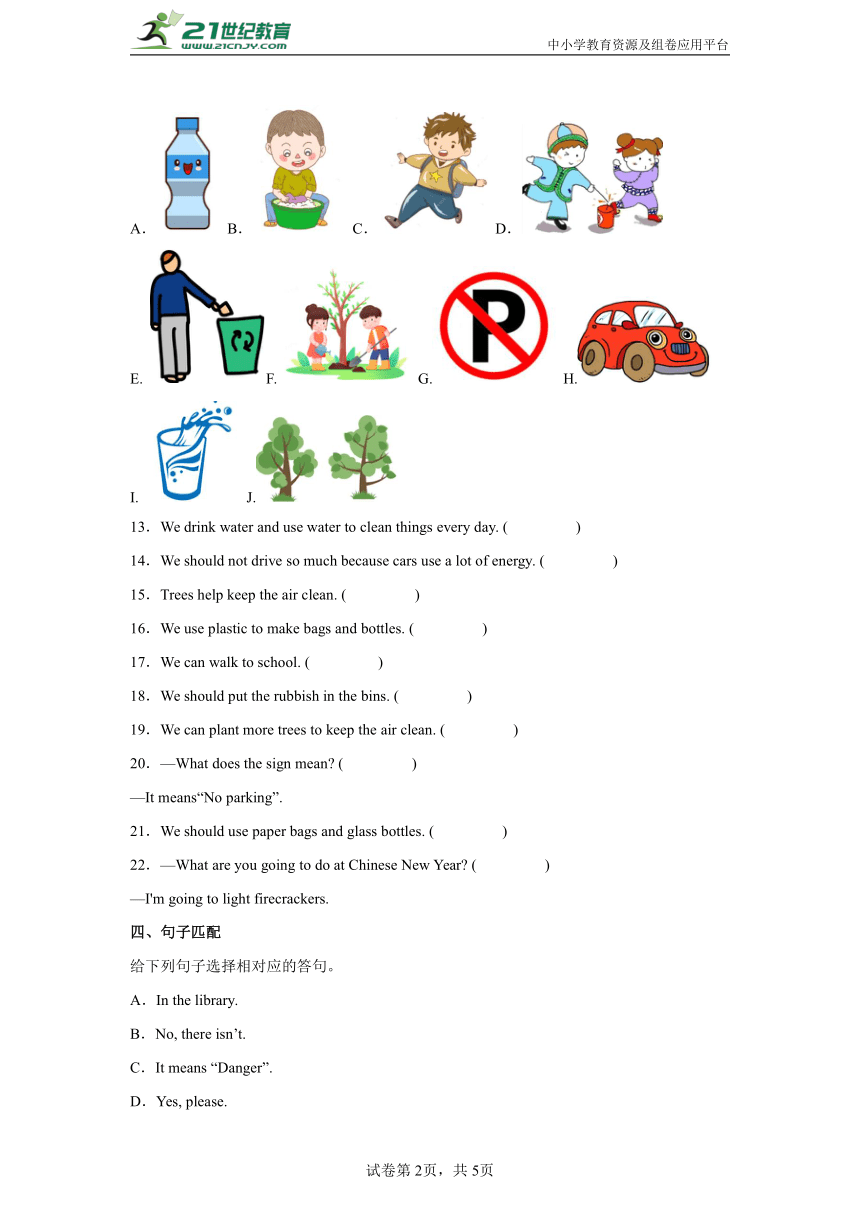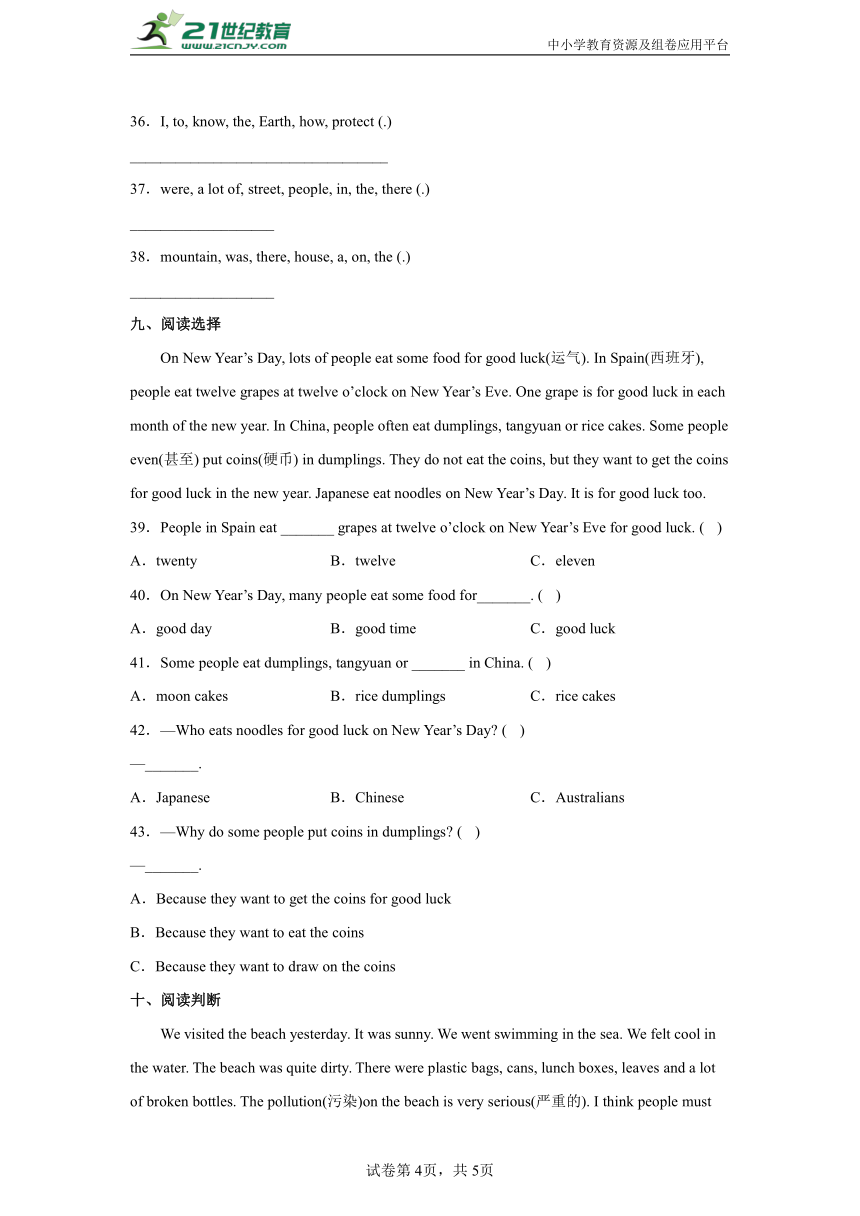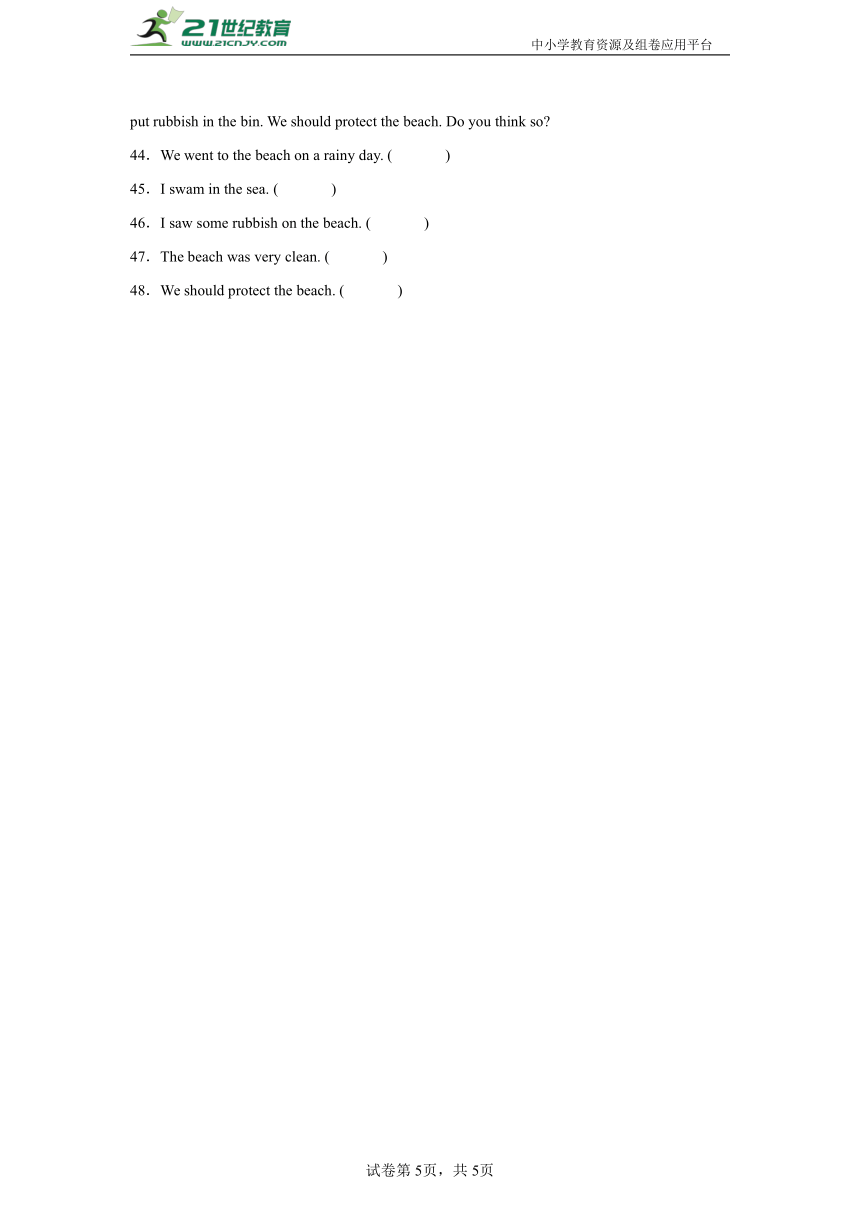开学重难点检测卷-小学英语六年级下册译林版(三起)(含答案)
文档属性
| 名称 | 开学重难点检测卷-小学英语六年级下册译林版(三起)(含答案) |  | |
| 格式 | docx | ||
| 文件大小 | 624.0KB | ||
| 资源类型 | 试卷 | ||
| 版本资源 | 牛津译林版 | ||
| 科目 | 英语 | ||
| 更新时间 | 2023-01-30 12:46:05 | ||
图片预览





文档简介
开学重难点检测卷-小学英语六年级下册译林版(三起)
一、单选题
1._______ it often _______ in autumn in Wuxi ( )
A.Does; rainy B.Does; rain C.Did; rainy
2.Where ________ oxygen (氧气) ________ from ( )
A.does; come B.do; is C.do; comes
3.He ________ his stamps ________ me this morning. ( )
A.shows; for B.showed; to C.showed; for D.showed; with
4.There _______ a lot of _______ in summer in Nanjing. ( )
A.is; rains B.are; rain C.is; rain
5.I cannot find my books. They ________ on the desk in the morning, but they ________ there now. ( )
A.are; were B.were; aren’t C.are; weren’t
6.My mother often _________ stories in the evening before I was ten. ( )
A.tell I B.told I C.told me
7.Each __________ a sentence. They each __________ a sentence.
A.boy say; says B.boys say; say C.boy says; say D.boys say; says
8.You shouldn’t drive . ( )
A.so many B.too many C.too much D.much too
9.There _______ a lot of people in the street yesterday. ( )
A.was B.were C.is
10.—Where ______ you yesterday ( )
—I ______ to Suzhou.
A.were; was B.did; was C.was; went D.were; went
二、选词/短语填空
11.Look, the boy _____ (is walking / walking) on the grass.
12.Long long ago, there _____ (was / were) many rabbits in the park.
三、句图匹配
A. B. C. D.
E. F. G. H.
I. J.
13.We drink water and use water to clean things every day. ( )
14.We should not drive so much because cars use a lot of energy. ( )
15.Trees help keep the air clean. ( )
16.We use plastic to make bags and bottles. ( )
17.We can walk to school. ( )
18.We should put the rubbish in the bins. ( )
19.We can plant more trees to keep the air clean. ( )
20.—What does the sign mean ( )
—It means“No parking”.
21.We should use paper bags and glass bottles. ( )
22.—What are you going to do at Chinese New Year ( )
—I'm going to light firecrackers.
四、句子匹配
给下列句子选择相对应的答句。
A.In the library.
B.No, there isn’t.
C.It means “Danger”.
D.Yes, please.
E. They’re on the wall.
23.What does that sign mean ( )
24.Do you want an apple ( )
25.Where are the signs ( )
26.Is there a sign on the door ( )
27.Where can we find the sign “No smoking” ( )
五、排序题
28.A.His mother bought him a new sweater yesterday.
B.I fit well.
C.Mike liked new clothes very much.
D.Mike was very happy.
E. He tried on the sweater.
( ) ( ) ( ) ( ) ( )
六、同义句转换
29.How lovely the flowers are! (同义句转换)
____________________________
30.The man showed me some new clothes. (改为同义句)
The man ____ some new clothes ____me.
31.Miss Li showed us her new dress this morning. (改为同义句)
Miss Li ____ her new dress ____ ____ this morning.
七、写出问答句
32.Does Eason like his sister at last (根据问句回答问题)
____________________________________
33.—________ ________ he go last Children’s Day (根据答句填写问句)
—He went to the Bund last Children’s Day.
34.Was there a fashion show yesterday afternoon (作否定回答)
No, ________ ________.
八、连词成句
35.clothes, boy, the, liked, new (.)
___________________
36.I, to, know, the, Earth, how, protect (.)
__________________________________
37.were, a lot of, street, people, in, the, there (.)
___________________
38.mountain, was, there, house, a, on, the (.)
___________________
九、阅读选择
On New Year’s Day, lots of people eat some food for good luck(运气). In Spain(西班牙), people eat twelve grapes at twelve o’clock on New Year’s Eve. One grape is for good luck in each month of the new year. In China, people often eat dumplings, tangyuan or rice cakes. Some people even(甚至) put coins(硬币) in dumplings. They do not eat the coins, but they want to get the coins for good luck in the new year. Japanese eat noodles on New Year’s Day. It is for good luck too.
39.People in Spain eat _______ grapes at twelve o’clock on New Year’s Eve for good luck. ( )
A.twenty B.twelve C.eleven
40.On New Year’s Day, many people eat some food for_______. ( )
A.good day B.good time C.good luck
41.Some people eat dumplings, tangyuan or _______ in China. ( )
A.moon cakes B.rice dumplings C.rice cakes
42.—Who eats noodles for good luck on New Year’s Day ( )
—_______.
A.Japanese B.Chinese C.Australians
43.—Why do some people put coins in dumplings ( )
—_______.
A.Because they want to get the coins for good luck
B.Because they want to eat the coins
C.Because they want to draw on the coins
十、阅读判断
We visited the beach yesterday. It was sunny. We went swimming in the sea. We felt cool in the water. The beach was quite dirty. There were plastic bags, cans, lunch boxes, leaves and a lot of broken bottles. The pollution(污染)on the beach is very serious(严重的). I think people must put rubbish in the bin. We should protect the beach. Do you think so
44.We went to the beach on a rainy day. ( )
45.I swam in the sea. ( )
46.I saw some rubbish on the beach. ( )
47.The beach was very clean. ( )
48.We should protect the beach. ( )
中小学教育资源及组卷应用平台
中小学教育资源及组卷应用平台
试卷第4页,共5页
试卷第5页,共5页
参考答案:
1.B
【详解】句意:无锡秋天经常下雨吗?本题考查动词形式。does助动词第三人称单数形式,did助动词过去式;rainy形容词,rain动词或名词。根据句意可知,句子缺少谓语动词,often是一般现在时的标志词,主语it是第三人称单数,疑问句应该借助助动词does,实意动词用原形,故选B。
2.A
【详解】句意:氧气来自哪里?该句为特殊疑问句,根据所给选项可知该句考查动词短语come from或者be from,来自,B选项语法错误;根据主语oxygen可知助动词要用does,排除C选项;故选A。
【点睛】
3.B
【详解】句意:他今天早上把他的邮票给我看了。根据句中的this morning,可知句子为一般过去时,谓语动词用动词过去式,show sth to sb把某物给某人看,show的过去式为showed,故选B。
【点睛】
4.C
【详解】句意:在南京夏天有很多雨水。该句是there be句型,rain是不可数名词,故be动词用is,rain不能加s,故选C。
5.B
【详解】句意:我找不到我的书。它们早上在桌子上,但现在_____那里。根据in the morning可知该句为一般过去时,be动词用过去式,are是现在时中的形式,were是are的过去式,故排除A、C选项;根据后半句中now可知后半句为现在时。aren't是一般现在时的形式,故选B。
6.C
【详解】句意:在我十岁之前的晚上,我妈妈经常给我讲故事。根据时间可知考查一般过去时,横线处的动词用过去式,told是tell的过去式,排除A;told是动词,后面跟人称代词宾格做宾语,me是I的宾格,排除B。故选C。
【点睛】
7.C
【详解】句意:每个男孩说一个句子。他们每人说个句子。此题考查each修饰可数名词单数,作主语,按第三人称单数处理,用say的第三人称单数says,后面句子的主语是they,动词用原形,故选C。
8.C
【解析】略
9.B
【详解】句意:昨天街上有很多人。本题考查there be句型,根据yesterday,可知句子是一般过去时,people是集合名词,be用are的过去式were,故选B。
10.D
【详解】句意:—昨天你在哪里?—我去了苏州。was系动词is/am过去式;were系动词are过去式;did助动词do/does过去式;went动词过去式;根据句中的yesterday,可知问句为一般过去时,主语you为第二人称,be动词用are过去式were;答句也为一般过去时,谓语动词用动词过去式,故选D。
【点睛】
11.is walking
【详解】句意:看,那个男孩正在草地上走。is walking现在进行时,walking动词现在分词或动名词,根据句中的look,可知句子是现在进行时,be doing结构,主语the boy是单数,be动词用is,is walking符合题意,故答案为is walking。
【点睛】
12.were
【详解】句意:很久以前,公园里有很多兔子。根据Long long ago很久以前,可以句子为一般过去时态。该句为there be句型,主语many rabbits是复数,be动词用were。故答案为were。
【点睛】
13.B 14.H 15.J 16.A 17.C 18.E 19.F 20.G 21.I 22.D
【分析】13.句意:我们每天喝水并用水来清洁东西。B图是用水洗东西,符合句意,故选B。
14.句意:我们不应该开那么多车因为汽车消耗能源。H图是汽车,符合句意,故选H。
15.句意:树有助于保持空气清洁。J图是树,符合句意,故选J。
16.句意:我们用塑料做袋子和瓶子。A图是瓶子,符合句意,故选A。
17.句意:我们可以步行去学校。C图是步行去学校,符合句意,故选C。
18.句意:我们应该把垃圾放进垃圾箱里。E图是把垃圾放进垃圾箱,符合句意,故选E。
19.句意:我们可以种更多的树来保持空气清洁。F图是种树,符合句意,故选F。
20.句意:—这个标志是什么意思?—它意思是“禁止停车”。G图是禁止停车,符合句意,故选G。
21.句意:我们应该使用纸袋和玻璃瓶。I图是玻璃瓶,符合句意,故选I。
22.句意:—在中国新年你打算做什么?—我打算放鞭炮。D图是放鞭炮,符合句意,故选D。
【点睛】
23.C 24.D 25.E 26.B 27.A
【解析】略
28. C A E B D
【详解】A. His mother bought him a new sweater yesterday.她的妈妈昨天给她买了一件新毛衣。
B. I fit well.我穿合适。
C. Mike liked new clothes very much.迈克非常喜欢他的新衣服。
D. Mike was very happy.迈克非常开心。
E. He tried on the sweater.他试穿了毛衣。
由对话可知在试穿新衣服。
1.首句,Mike liked new clothes very much.迈克非常喜欢他的新衣服。
2.A. His mother bought him a new sweater yesterday.她的妈妈昨天给她买了一件新毛衣
3.然后试穿,E. He tried on the sweater.他试穿了毛衣。
4.B. I fit well.我穿合适
5.最后,Mike was very happy.迈克非常开心。
故答案为C;A;E;B;D。
29.What lovely flowers they are!
【详解】原句句意:这些花多么可爱啊!该句是由How引导感叹句,感叹句的构成:What +形容词 + 复数名词 +主语 +谓语 + 其他!How + 形容词 / 副词 + 主语 +谓语!改为同义句即改为由what引导的感叹句,故答案为What lovely flowers they are!
【点睛】
30. showed to
【详解】句意:那个男人给我看了一些新衣服。题干要求改为同义句,show sb sth=show sth to sb,原句是一般过去时,句子也是一般过去时,谓语动词用动词过去式,show过去式为showed,故答案为showed;to。
【点睛】
31. showed to us
【详解】句意:今天上午,李小姐给我们看了她的新连衣裙。给某人看某物show somebody something =showed something to sb。故答案为showed;to;us。
32.答案不唯一,如Yes, he does.
【详解】句意:伊森最终喜欢他的姐姐/妹妹了吗?该句为Does引导的一般疑问句,可以作肯定回答:Yes, 主语+助动词。他he,是第三人称单数,助动词用does。故答案为Yes, he does.
【点睛】
33. Where did
【详解】略
34. there wasn’t
【详解】句意:昨天下午有时装秀吗?该句是there be句型,其否定回答为No, there wasn't. 故答案为there;wasn't。
【点睛】
35.The boy liked new clothes.
【详解】clothes衣服,boy男孩,the定冠词,liked喜欢,new新的,根据所给的句号和单词,可知句子是陈述句的肯定形式,根据所给的词义可以连成句子:这个男孩喜欢新衣服。故答案为The boy liked new clothes.
【点睛】
36.I know how to protect the Earth.
【详解】I我,to到,know知道,the表示特指,Earth地球,how怎样,protect保护,根据所给的句号,可知句子是一个陈述句,根据所给词义可以连成句子:我知道怎么保护地球。故答案为I know how to protect the Earth.
37.There were a lot of people in the street.
【详解】there were有,a lot of许多,people人们,in the street在街上,根据所给的句号可知这是一个陈述句,根据所给的词义可以连成句子:街上有许多人。故答案为There were a lot of people in the street.
【点睛】
38.There was a house on the mountain.
【详解】 on the mountain在大山上,there was有,house房子,a一,根据所给的句号,可知句子是一个陈述句,根据所给词义可以连成句子:大山上有一个房子。故答案为There was a house on the mountain.
【点睛】
39.B 40.C 41.C 42.A 43.A
【导语】本文讲了在元旦那天,许多人吃一些食物以求好运。
39.句意:西班牙人在除夕十二点吃______颗葡萄以求好运。A二十,B十二,C十一,根据“In Spain(西班牙), people eat twelve grapes at twelve o’clock on New Year’s Eve.”,可知西班牙人在除夕十二点吃十二颗葡萄以求好运,故选B。
40.句意:在元旦,许多人吃一些食物以求______。A很好的一天,B好时机,C好运,根据“On New Year’s Day, lots of people eat some food for good luck(运气).”,可知在元旦,许多人吃一些食物以求好运,故选C。
41.句意:在中国,一些人吃饺子,汤圆或_______。A月饼,B粽子,C年糕,根据“In China, people often eat dumplings, tangyuan or rice cakes.”,可知在中国,一些人吃饺子、汤圆或年糕,故选C。
42.句意:谁在元旦吃面条以求好运?A日本人,B中国人,C澳大利亚人,根据“Japanese eat noodles on New Year’s Day.”,可知日本人在元旦吃面条以求好运,故选A。
43.句意:为什么有些人在饺子里放硬币?A因为他们想得硬币以求好远,B因为他们想吃硬币,C因为他们想在硬币上画画,根据“Some people even(甚至) put coins(硬币) in dumplings. They do not eat the coins, but they want to get the coins for good luck in the new year.”,可知有些人在饺子里放硬币,是因为他们想得硬币以求好远,故选A。
44.F 45.T 46.T 47.F 48.T
【导语】本文讲述了作者昨天去海滩做的事情及所见,所感。
44.题干句意:我们在一个雨天去了海边。根据We visited the beach yesterday. It was sunny. 可知是晴天。故题干错误,故答案为F。
45.题干句意:我在海里游泳了。根据We went swimming in the sea. 可知题干正确,故答案为T。
46.题干句意:我在海滩上看见了一些垃圾。根据 There were plastic bags, cans, lunch boxes, leaves and a lot of broken bottles.可知题干正确,故答案为T。
47.题干句意:海滩非常干净。根据The beach was quite dirty. 可知海滩很脏。故题干错误,故答案为F。
48.题干句意:我们应该保护海滩。根据We should protect the beach.可知题干正确,故答案为T。
答案第2页,共6页
答案第1页,共6页
一、单选题
1._______ it often _______ in autumn in Wuxi ( )
A.Does; rainy B.Does; rain C.Did; rainy
2.Where ________ oxygen (氧气) ________ from ( )
A.does; come B.do; is C.do; comes
3.He ________ his stamps ________ me this morning. ( )
A.shows; for B.showed; to C.showed; for D.showed; with
4.There _______ a lot of _______ in summer in Nanjing. ( )
A.is; rains B.are; rain C.is; rain
5.I cannot find my books. They ________ on the desk in the morning, but they ________ there now. ( )
A.are; were B.were; aren’t C.are; weren’t
6.My mother often _________ stories in the evening before I was ten. ( )
A.tell I B.told I C.told me
7.Each __________ a sentence. They each __________ a sentence.
A.boy say; says B.boys say; say C.boy says; say D.boys say; says
8.You shouldn’t drive . ( )
A.so many B.too many C.too much D.much too
9.There _______ a lot of people in the street yesterday. ( )
A.was B.were C.is
10.—Where ______ you yesterday ( )
—I ______ to Suzhou.
A.were; was B.did; was C.was; went D.were; went
二、选词/短语填空
11.Look, the boy _____ (is walking / walking) on the grass.
12.Long long ago, there _____ (was / were) many rabbits in the park.
三、句图匹配
A. B. C. D.
E. F. G. H.
I. J.
13.We drink water and use water to clean things every day. ( )
14.We should not drive so much because cars use a lot of energy. ( )
15.Trees help keep the air clean. ( )
16.We use plastic to make bags and bottles. ( )
17.We can walk to school. ( )
18.We should put the rubbish in the bins. ( )
19.We can plant more trees to keep the air clean. ( )
20.—What does the sign mean ( )
—It means“No parking”.
21.We should use paper bags and glass bottles. ( )
22.—What are you going to do at Chinese New Year ( )
—I'm going to light firecrackers.
四、句子匹配
给下列句子选择相对应的答句。
A.In the library.
B.No, there isn’t.
C.It means “Danger”.
D.Yes, please.
E. They’re on the wall.
23.What does that sign mean ( )
24.Do you want an apple ( )
25.Where are the signs ( )
26.Is there a sign on the door ( )
27.Where can we find the sign “No smoking” ( )
五、排序题
28.A.His mother bought him a new sweater yesterday.
B.I fit well.
C.Mike liked new clothes very much.
D.Mike was very happy.
E. He tried on the sweater.
( ) ( ) ( ) ( ) ( )
六、同义句转换
29.How lovely the flowers are! (同义句转换)
____________________________
30.The man showed me some new clothes. (改为同义句)
The man ____ some new clothes ____me.
31.Miss Li showed us her new dress this morning. (改为同义句)
Miss Li ____ her new dress ____ ____ this morning.
七、写出问答句
32.Does Eason like his sister at last (根据问句回答问题)
____________________________________
33.—________ ________ he go last Children’s Day (根据答句填写问句)
—He went to the Bund last Children’s Day.
34.Was there a fashion show yesterday afternoon (作否定回答)
No, ________ ________.
八、连词成句
35.clothes, boy, the, liked, new (.)
___________________
36.I, to, know, the, Earth, how, protect (.)
__________________________________
37.were, a lot of, street, people, in, the, there (.)
___________________
38.mountain, was, there, house, a, on, the (.)
___________________
九、阅读选择
On New Year’s Day, lots of people eat some food for good luck(运气). In Spain(西班牙), people eat twelve grapes at twelve o’clock on New Year’s Eve. One grape is for good luck in each month of the new year. In China, people often eat dumplings, tangyuan or rice cakes. Some people even(甚至) put coins(硬币) in dumplings. They do not eat the coins, but they want to get the coins for good luck in the new year. Japanese eat noodles on New Year’s Day. It is for good luck too.
39.People in Spain eat _______ grapes at twelve o’clock on New Year’s Eve for good luck. ( )
A.twenty B.twelve C.eleven
40.On New Year’s Day, many people eat some food for_______. ( )
A.good day B.good time C.good luck
41.Some people eat dumplings, tangyuan or _______ in China. ( )
A.moon cakes B.rice dumplings C.rice cakes
42.—Who eats noodles for good luck on New Year’s Day ( )
—_______.
A.Japanese B.Chinese C.Australians
43.—Why do some people put coins in dumplings ( )
—_______.
A.Because they want to get the coins for good luck
B.Because they want to eat the coins
C.Because they want to draw on the coins
十、阅读判断
We visited the beach yesterday. It was sunny. We went swimming in the sea. We felt cool in the water. The beach was quite dirty. There were plastic bags, cans, lunch boxes, leaves and a lot of broken bottles. The pollution(污染)on the beach is very serious(严重的). I think people must put rubbish in the bin. We should protect the beach. Do you think so
44.We went to the beach on a rainy day. ( )
45.I swam in the sea. ( )
46.I saw some rubbish on the beach. ( )
47.The beach was very clean. ( )
48.We should protect the beach. ( )
中小学教育资源及组卷应用平台
中小学教育资源及组卷应用平台
试卷第4页,共5页
试卷第5页,共5页
参考答案:
1.B
【详解】句意:无锡秋天经常下雨吗?本题考查动词形式。does助动词第三人称单数形式,did助动词过去式;rainy形容词,rain动词或名词。根据句意可知,句子缺少谓语动词,often是一般现在时的标志词,主语it是第三人称单数,疑问句应该借助助动词does,实意动词用原形,故选B。
2.A
【详解】句意:氧气来自哪里?该句为特殊疑问句,根据所给选项可知该句考查动词短语come from或者be from,来自,B选项语法错误;根据主语oxygen可知助动词要用does,排除C选项;故选A。
【点睛】
3.B
【详解】句意:他今天早上把他的邮票给我看了。根据句中的this morning,可知句子为一般过去时,谓语动词用动词过去式,show sth to sb把某物给某人看,show的过去式为showed,故选B。
【点睛】
4.C
【详解】句意:在南京夏天有很多雨水。该句是there be句型,rain是不可数名词,故be动词用is,rain不能加s,故选C。
5.B
【详解】句意:我找不到我的书。它们早上在桌子上,但现在_____那里。根据in the morning可知该句为一般过去时,be动词用过去式,are是现在时中的形式,were是are的过去式,故排除A、C选项;根据后半句中now可知后半句为现在时。aren't是一般现在时的形式,故选B。
6.C
【详解】句意:在我十岁之前的晚上,我妈妈经常给我讲故事。根据时间可知考查一般过去时,横线处的动词用过去式,told是tell的过去式,排除A;told是动词,后面跟人称代词宾格做宾语,me是I的宾格,排除B。故选C。
【点睛】
7.C
【详解】句意:每个男孩说一个句子。他们每人说个句子。此题考查each修饰可数名词单数,作主语,按第三人称单数处理,用say的第三人称单数says,后面句子的主语是they,动词用原形,故选C。
8.C
【解析】略
9.B
【详解】句意:昨天街上有很多人。本题考查there be句型,根据yesterday,可知句子是一般过去时,people是集合名词,be用are的过去式were,故选B。
10.D
【详解】句意:—昨天你在哪里?—我去了苏州。was系动词is/am过去式;were系动词are过去式;did助动词do/does过去式;went动词过去式;根据句中的yesterday,可知问句为一般过去时,主语you为第二人称,be动词用are过去式were;答句也为一般过去时,谓语动词用动词过去式,故选D。
【点睛】
11.is walking
【详解】句意:看,那个男孩正在草地上走。is walking现在进行时,walking动词现在分词或动名词,根据句中的look,可知句子是现在进行时,be doing结构,主语the boy是单数,be动词用is,is walking符合题意,故答案为is walking。
【点睛】
12.were
【详解】句意:很久以前,公园里有很多兔子。根据Long long ago很久以前,可以句子为一般过去时态。该句为there be句型,主语many rabbits是复数,be动词用were。故答案为were。
【点睛】
13.B 14.H 15.J 16.A 17.C 18.E 19.F 20.G 21.I 22.D
【分析】13.句意:我们每天喝水并用水来清洁东西。B图是用水洗东西,符合句意,故选B。
14.句意:我们不应该开那么多车因为汽车消耗能源。H图是汽车,符合句意,故选H。
15.句意:树有助于保持空气清洁。J图是树,符合句意,故选J。
16.句意:我们用塑料做袋子和瓶子。A图是瓶子,符合句意,故选A。
17.句意:我们可以步行去学校。C图是步行去学校,符合句意,故选C。
18.句意:我们应该把垃圾放进垃圾箱里。E图是把垃圾放进垃圾箱,符合句意,故选E。
19.句意:我们可以种更多的树来保持空气清洁。F图是种树,符合句意,故选F。
20.句意:—这个标志是什么意思?—它意思是“禁止停车”。G图是禁止停车,符合句意,故选G。
21.句意:我们应该使用纸袋和玻璃瓶。I图是玻璃瓶,符合句意,故选I。
22.句意:—在中国新年你打算做什么?—我打算放鞭炮。D图是放鞭炮,符合句意,故选D。
【点睛】
23.C 24.D 25.E 26.B 27.A
【解析】略
28. C A E B D
【详解】A. His mother bought him a new sweater yesterday.她的妈妈昨天给她买了一件新毛衣。
B. I fit well.我穿合适。
C. Mike liked new clothes very much.迈克非常喜欢他的新衣服。
D. Mike was very happy.迈克非常开心。
E. He tried on the sweater.他试穿了毛衣。
由对话可知在试穿新衣服。
1.首句,Mike liked new clothes very much.迈克非常喜欢他的新衣服。
2.A. His mother bought him a new sweater yesterday.她的妈妈昨天给她买了一件新毛衣
3.然后试穿,E. He tried on the sweater.他试穿了毛衣。
4.B. I fit well.我穿合适
5.最后,Mike was very happy.迈克非常开心。
故答案为C;A;E;B;D。
29.What lovely flowers they are!
【详解】原句句意:这些花多么可爱啊!该句是由How引导感叹句,感叹句的构成:What +形容词 + 复数名词 +主语 +谓语 + 其他!How + 形容词 / 副词 + 主语 +谓语!改为同义句即改为由what引导的感叹句,故答案为What lovely flowers they are!
【点睛】
30. showed to
【详解】句意:那个男人给我看了一些新衣服。题干要求改为同义句,show sb sth=show sth to sb,原句是一般过去时,句子也是一般过去时,谓语动词用动词过去式,show过去式为showed,故答案为showed;to。
【点睛】
31. showed to us
【详解】句意:今天上午,李小姐给我们看了她的新连衣裙。给某人看某物show somebody something =showed something to sb。故答案为showed;to;us。
32.答案不唯一,如Yes, he does.
【详解】句意:伊森最终喜欢他的姐姐/妹妹了吗?该句为Does引导的一般疑问句,可以作肯定回答:Yes, 主语+助动词。他he,是第三人称单数,助动词用does。故答案为Yes, he does.
【点睛】
33. Where did
【详解】略
34. there wasn’t
【详解】句意:昨天下午有时装秀吗?该句是there be句型,其否定回答为No, there wasn't. 故答案为there;wasn't。
【点睛】
35.The boy liked new clothes.
【详解】clothes衣服,boy男孩,the定冠词,liked喜欢,new新的,根据所给的句号和单词,可知句子是陈述句的肯定形式,根据所给的词义可以连成句子:这个男孩喜欢新衣服。故答案为The boy liked new clothes.
【点睛】
36.I know how to protect the Earth.
【详解】I我,to到,know知道,the表示特指,Earth地球,how怎样,protect保护,根据所给的句号,可知句子是一个陈述句,根据所给词义可以连成句子:我知道怎么保护地球。故答案为I know how to protect the Earth.
37.There were a lot of people in the street.
【详解】there were有,a lot of许多,people人们,in the street在街上,根据所给的句号可知这是一个陈述句,根据所给的词义可以连成句子:街上有许多人。故答案为There were a lot of people in the street.
【点睛】
38.There was a house on the mountain.
【详解】 on the mountain在大山上,there was有,house房子,a一,根据所给的句号,可知句子是一个陈述句,根据所给词义可以连成句子:大山上有一个房子。故答案为There was a house on the mountain.
【点睛】
39.B 40.C 41.C 42.A 43.A
【导语】本文讲了在元旦那天,许多人吃一些食物以求好运。
39.句意:西班牙人在除夕十二点吃______颗葡萄以求好运。A二十,B十二,C十一,根据“In Spain(西班牙), people eat twelve grapes at twelve o’clock on New Year’s Eve.”,可知西班牙人在除夕十二点吃十二颗葡萄以求好运,故选B。
40.句意:在元旦,许多人吃一些食物以求______。A很好的一天,B好时机,C好运,根据“On New Year’s Day, lots of people eat some food for good luck(运气).”,可知在元旦,许多人吃一些食物以求好运,故选C。
41.句意:在中国,一些人吃饺子,汤圆或_______。A月饼,B粽子,C年糕,根据“In China, people often eat dumplings, tangyuan or rice cakes.”,可知在中国,一些人吃饺子、汤圆或年糕,故选C。
42.句意:谁在元旦吃面条以求好运?A日本人,B中国人,C澳大利亚人,根据“Japanese eat noodles on New Year’s Day.”,可知日本人在元旦吃面条以求好运,故选A。
43.句意:为什么有些人在饺子里放硬币?A因为他们想得硬币以求好远,B因为他们想吃硬币,C因为他们想在硬币上画画,根据“Some people even(甚至) put coins(硬币) in dumplings. They do not eat the coins, but they want to get the coins for good luck in the new year.”,可知有些人在饺子里放硬币,是因为他们想得硬币以求好远,故选A。
44.F 45.T 46.T 47.F 48.T
【导语】本文讲述了作者昨天去海滩做的事情及所见,所感。
44.题干句意:我们在一个雨天去了海边。根据We visited the beach yesterday. It was sunny. 可知是晴天。故题干错误,故答案为F。
45.题干句意:我在海里游泳了。根据We went swimming in the sea. 可知题干正确,故答案为T。
46.题干句意:我在海滩上看见了一些垃圾。根据 There were plastic bags, cans, lunch boxes, leaves and a lot of broken bottles.可知题干正确,故答案为T。
47.题干句意:海滩非常干净。根据The beach was quite dirty. 可知海滩很脏。故题干错误,故答案为F。
48.题干句意:我们应该保护海滩。根据We should protect the beach.可知题干正确,故答案为T。
答案第2页,共6页
答案第1页,共6页
